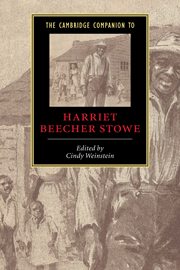Book contents
- Frontmatter
- Introduction
- 1 Stowe and race
- 2 Uncle Tom’s Cabin and the south
- 3 Uncle Tom’s Cabin and the American Renaissance
- 4 Reading and children:Uncle Tom’s Cabin and The Pearl of Orr’s Island
- 5 Uncle Tom and Harriet Beecher Stowe in England
- 6 Staging black insurrection: Dred on stage
- 7 Stowe and regionalism
- 8 Stowe and the law
- 9 Harriet Beecher Stowe and the American reform tradition
- 10 Harriet Beecher Stowe and the dream of the great American novel
- 11 Stowe and the literature of social change
- 12 The afterlife of Uncle Tom’s Cabin
- Select bibliography
- Index
- Series List
9 - Harriet Beecher Stowe and the American reform tradition
Published online by Cambridge University Press: 28 May 2006
- Frontmatter
- Introduction
- 1 Stowe and race
- 2 Uncle Tom’s Cabin and the south
- 3 Uncle Tom’s Cabin and the American Renaissance
- 4 Reading and children:Uncle Tom’s Cabin and The Pearl of Orr’s Island
- 5 Uncle Tom and Harriet Beecher Stowe in England
- 6 Staging black insurrection: Dred on stage
- 7 Stowe and regionalism
- 8 Stowe and the law
- 9 Harriet Beecher Stowe and the American reform tradition
- 10 Harriet Beecher Stowe and the dream of the great American novel
- 11 Stowe and the literature of social change
- 12 The afterlife of Uncle Tom’s Cabin
- Select bibliography
- Index
- Series List
Summary
One of the more curious passages by Harriet Beecher Stowe appears in a novel by someone else. In August 1857 she contributed a “Preface” for the second novel by an African-American author, Frank J. Webb's The Garies and Their Friends. After acknowledging violence against free black people and abolitionists in the north, especially virulent in the 1830s and a matter central to the novel, Stowe claimed that “this spirit was subdued, and the right of free inquiry established . . .” Had she concluded there, this might simply be an example of a northerner congratulating her section on its moral superiority to the south. She added, however, that “the question [of freedom for African Americans], so far from being dangerous in the Free States, is now begun to be allowed in the slave States . . .” Stowe must have known how wrong this was. Her second anti-slavery novel, Dred: A Tale of the Great Dismal Swamp (1856), appeared a year before The Garies and a large part of its plot revolved around southern suppression, often violent, of anti-slavery speeches and publications.
The key to understanding how someone who went to great lengths to defend her accuracy could be so misguided is in the final words of the paragraph. “[T]here are,” she wrote, “some subjects the mere discussion of which is a half-victory.” Stowe was less interested in southern openness to antislavery views – which hostile southern responses to her novels should have led her to doubt – than in defending the power of words to change individuals and, through them, society. As she put it in her 1854 “Appeal to the Women of the Free States,” “there is not a woman in the United States, when the question [of slavery] is fairly put before her, who thinks these things are right.”
- Type
- Chapter
- Information
- The Cambridge Companion to Harriet Beecher Stowe , pp. 171 - 189Publisher: Cambridge University PressPrint publication year: 2004



